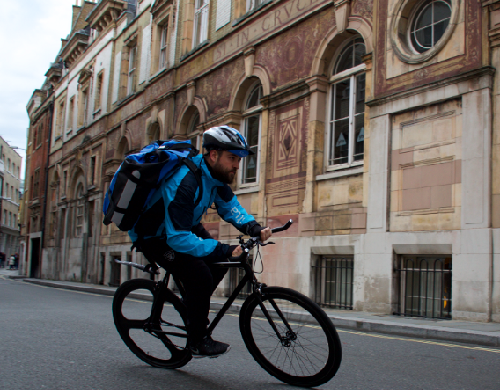Stuart expands last mile delivery services in the UK

Last mile logistics firm Stuart has expanded its ‘hub to home’ delivery service to three new regions across the UK and has unveiled some of its plans for further growth as consumer demand for fast, precise and sustainable delivery options continues to grow.
The DPDgroup courier subsidiary previously covered London and the M25 only, but now its operations will be scaled to Birmingham, Manchester and Leeds. Scaling the operations to new cities will enable Stuart to provide services to a larger geographical area.
The firm’s Hub to Home model consists of a final mile delivery offering including same day and next day services via a fleet of 100% electric vehicles. Customers can select a three-hour delivery slot, in the morning, afternoon and evening, with a one-hour window provided upon dispatch.
The new hubs will repurpose underutilised properties in urban areas, creating cost effective, flexible spaces that are aligned to Stuart’s sustainability values.
Founded in Paris, France, in 2015, Stuart is a tech logistics company that connects businesses of all sizes to couriers to offer on-demand, same day and next day delivery built on precision, speed and flexibility. Stuart, a subsidiary of DPDgroup, currently operates millions of deliveries every month across over 150 cities in the UK, France, Spain, Portugal, Poland and Italy.
“Our retail proposition focuses on minimising touches from retailer distribution centres or stores, delivering parcels to consumers via 100% electric vehicles, a one-hour customer promise and built in tracking and visibility,” said Marcus Hurd, Director of Stuart’s Hub to Home operations. “Being able to bring this proposition to life across three other major cities in the UK, outside of London, is a huge milestone and repurposing underutilised properties in urban areas as our operating centres really aligns with our sustainable values.”
The Delivery Conference
The expansion comes at a time when convenience and predictability are more important than ever in maintaining customer loyalty, and convenience is different for every consumer. A recent Stuart study revealed that 62% of consumers expect next-day delivery when ordering online and 55% want two-hour time slots (up from 44% in 2020), with expectation for same day delivery services increasing consistently each year.
Hurd spoke in more detail about last mile delivery trends and challenges at The Delivery Conference 2023 (TDC) yesterday (February 8). He noted that whilst demand for same-day delivery slowed slightly during the pandemic, it is now growing again, as are consumer expectations. “Competition in the fast delivery space is set to intensify as it becomes a key tool of competition,” he said.
According to Stuart figures presented at TDC, the total number of parcels being delivered same-day or next-day in the UK, France and Spain is expected to rise from 1,976 million in 2022 to 3,228 million in 2027.
“We believe that the trend for same-day delivery is going to increase, and it will become an expected check-out delivery option for consumers,” Hurd said. “For carriers and retailers, if we are going to move fast then we need to develop innovative ways to manage inventory. A lot of the clients we are currently talking to are already on the journey of how they can create more visibility of their store inventory and how they can locate products closer to their consumers for faster delivery.”
Hurd also highlighted how flexible and convenient delivery options are essential and stressed that in-flight delivery solutions, which are designed to look and feel like the brand supplying the product rather than the delivery firm, will help to make delivery feel really personal, driving brand loyalty.
Sustainability
Hurd also spoke in detail about the delivery sector’s role in sustainability. “We need to do more when it comes to how we are demonstrating the true environmental impact of parcel logistics,” he said. “And we need to make it easier for consumers to access environmental information, and more meaningful when they do.
“We are also starting to talk to a lot of Stuart’s partners about how we can make sustainability the default choice for delivery,” he continued. Whilst 43% of e-commerce shoppers are likely to select a brand or a delivery process that is sustainable, only 23% of consumers are willing to pay for it. And of those willing to pay, the amount is often not reflective of the prices for sustainable services in the market.
“There also needs to be rationale around how we work in the e-commerce market to reduce the distances that parcels travel, to reduce the number of times we handle them, and how we make smarter choices to make each one of those touchpoints on the journey of a parcel, slicker and more efficient. In doing so, we will meaningfully alter the sustainable credentials of parcel delivery,” he added.

